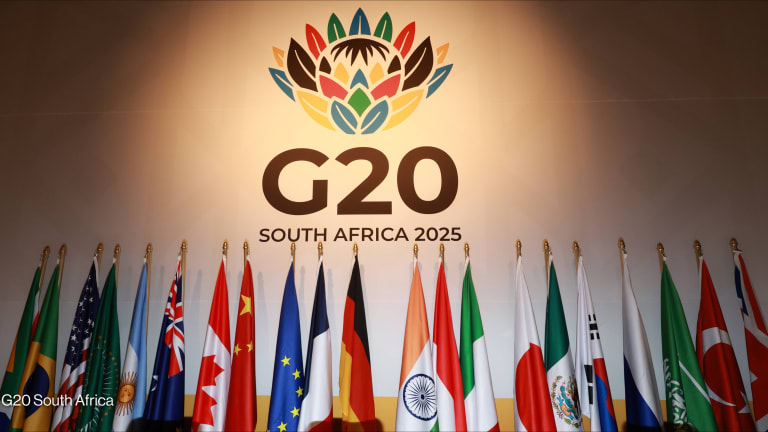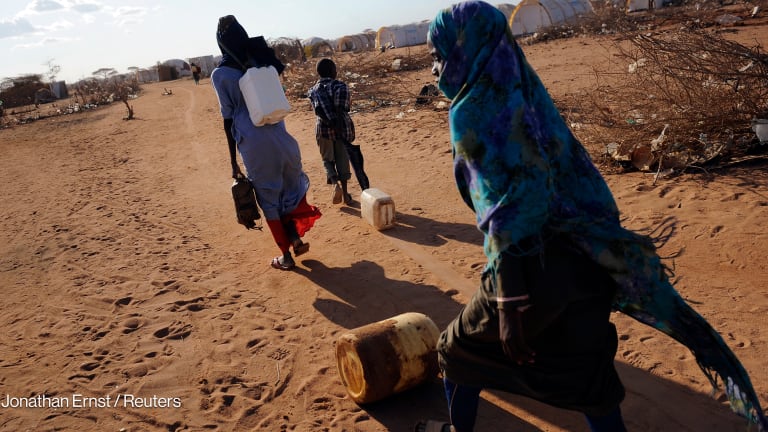
There is a heightened risk of defaults on the African continent as a result of the COVID-19 pandemic, which has led to heavier debt burdens while worsening poverty and widening inequality, the African Development Bank has warned.
“The deep scars of the pandemic are really there and will take time to heal,” bank President Akinwumi Adesina said. Speaking Wednesday at the opening public event of the bank’s annual meetings, he grimly cautioned that the continent must avoid another “lost decade” for growth and development.
“If there is no debt relief and restructuring, many more countries will slide into debt distress,” he said.
The average ratio of debt to gross domestic product across Africa is expected to increase from 60% in 2019 to 70%, according to AfDB, and that number could go higher still. The International Monetary Fund estimates that African countries will need an additional $285 billion in financing through 2025 to deal with the fallout from the pandemic.
Speaking to Devex ahead of the bank’s meetings, Kevin Urama, a senior director at AfDB, said that there are “risks” of defaults and that the pace of COVID-19 vaccine rollouts, which so far has lagged, will determine the road ahead for the continent.
“We do need emergency relief. We need much more ambition in terms of providing a fiscal stimulus package for Africa.”
—David McNair, global policy executive director, ONE Campaign“We don’t expect that by the end of this year African countries will be back to booming again,” he said. A recovery off of last year’s pandemic lows will not be sufficient to justify lifting temporary relief measures, he added.
Last year, wealthy nations agreed to the Debt Service Suspension Initiative, which allows the world’s lowest-income countries to delay debt payments. So far, this has led to several billion dollars in relief for such countries, according to the World Bank. Out of the 73 countries that are eligible, over 40 governments have received temporary relief on their bilateral loans to members of the G-20 group of nations.
Critically, the initiative does not include private creditors, which make up a rising proportion of lending to Africa nations. Commercial creditors now account for twice as much of the continent’s total external debt as they did in 2000, according to AfDB.
The DSSI has been extended — twice — until the end of this year. But the G-20 signaled in April that another delay is not in the cards. This could lead to a sharp spike in repayment over the coming years.
“We could be looking at a much more challenging situation,” David McNair, global policy executive director at the ONE Campaign, told Devex, warning that debt burdens would set back poverty eradication efforts.
“We do need emergency relief. We need much more ambition in terms of providing a fiscal stimulus package for Africa,” McNair said.
He noted that China is an ever-larger creditor in Africa and called for Beijing to step up its own relief efforts. The lack of transparency on Chinese loans is also an issue.
When Zambia became the first African nation to default during the pandemic, there was concern among Western investors that bailout funds would be used to pay back China, sparking hesitation among other creditors and bondholders about striking a relief agreement.
The debt crisis is not isolated to the lowest-income countries. Middle-income nations are also facing stress, as they do not have access to the cheapest loans from development lenders, raising the cost of their borrowing.
Rising borrowing costs set off a “vicious cycle,” Urama said. “The higher the cost of the loan, the higher the risk of default.” And once a country is at a greater risk of default, its credit rating drops and the debt price moves higher yet again.
Credit rating agencies also tend to get spooked at signs of debt restructuring, even when it is part of a globally coordinated mechanism. Ethiopia was hit with downgrades from ratings agencies this year when it sought relief from the G20 Common Framework for Debt Treatments Beyond the DSSI.
McNair at the ONE Campaign said this means countries are being “punished” for using the specially designed international system.
One solution might be in the form of special assets. On Friday, the IMF board is due to discuss the issuance of Special Drawing Rights, which would bolster the reserves of member states, giving them more firepower to deal with the pandemic. Some $650 billion in SDRs could be issued, though only a fraction would go to low-income countries, leaving them short on targets.
African officials, including those at the AfDB meetings, and anti-poverty campaigners are calling on wealthy nations to transfer their SDRs to countries more in need of the cushion.
The idea is gaining traction, with France recently pushing for wealthy nations to agree to chip in and allocate $100 billion to Africa.
Credit ratings agency S&P Global has said that should wealthy nations pony up and allocate 42% of their SDRs, the reserves of 44 low-income countries it monitors will hit adequate levels.
Over the longer term, AfDB says African nations need systemic reforms to boost their tax bases, improve infrastructure, end corruption, and use their debt better. These persistent issues were plaguing many countries even prior to the pandemic.
“Unless there is good economic governance, debt relief may not lead to growth,” Adesina said.








